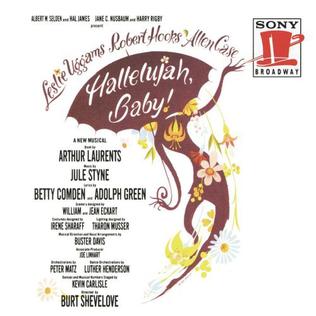
Hallelujah, Baby!
Hallelujah, Baby! is a musical with music by Jule Styne, lyrics by Adolph Green and Betty Comden, and a book by Arthur Laurents. The show is "a chronicle of the African American struggle for equality during the [first half of the] 20th century."[1]
Hallelujah, Baby!
1967 Broadway
2004 Arena Stage
George Street Playhouse
The musical premiered on Broadway in 1967 and made a young Leslie Uggams a star. It won the Tony Award for Best Musical. In 2004, Laurents restaged the show twice with the same cast, in Washington D.C at the Arena Stage and at the George Street Playhouse in New Jersey, in order to update and streamline the story for modern sensibilities, and potentially move to New York for a full revival. The score was updated by Adolph Green's daughter, Amanda Green. Critics noted that although the score and performances were entertaining and had its merits, the book was still too outdated. [2][3]
Synopsis[edit]
Georgina is a talented, beautiful and ambitious African American woman, determined to have a career. Overcoming many obstacles, she rises to stardom. She makes her way through the Great Depression, World War II, and the beginning of the civil rights movement. Her mother advises her to "keep her place" as a maid on a South Carolina estate, but Georgina negotiates the blocks to stardom from her negative and opportunistic mother. She encounters the racism that pervades society and show business.
Two men vie for Georgina's attention. Harvey, who is white, is able to provide opportunities for her. Her fiancé, Clem, who is a black train porter, cannot help her on her journey. By the 1950s, she is a successful singer in an expensive night club. However, Clem, who became an Army captain and then a civil rights activist, challenges Georgina's life goals.
Productions[edit]
The musical opened on Broadway at the Martin Beck Theatre on April 26, 1967, and closed on January 13, 1968, after 293 performances and 22 previews. It was directed by Burt Shevelove, choreographed by Kevin Carlisle, musical direction by Buster Davis, orchestrations by Peter Matz, with scenic design by William and Jean Eckart, costumes by Irene Sharaff and lighting by Tharon Musser. The production won five Tony Awards (out of nine nominations), including Best Musical, and Uggams and Hayman won the Tonys for Best Actress and Best Featured Actress, respectively, for their performances. This remains the only show to win the Tony for Best Musical after it closed.
Laurents' recollections[edit]
Arthur Laurents felt that "the original production was too soft in its take on black social progress during the first six decades or so of the twentieth century. It was originally written with Lena Horne in mind. When the steely Horne opted out of the project, it was rewritten to suit the more youthful and bubbly Leslie Uggams." In the 2004 production, Laurents attempted "to add levels of darker intensity.... However, the music and lyrics are in the infectiously bright and bubbly style of musical comedy, and his efforts in this area reduce the charm and good spirits of the show without adding much of significance in the way of depth or insight."[8] According to Laurents, after Lena Horne declined to do the show, "What we should have done is abandon the show.... Instead it was rewriten for a woman who is one of the nicest women I have ever met in the theatre, Leslie Uggams,--and, God knows, she has a beautiful voice ... she was good, but it wasn't that original show. The show lost its edge, and I must say I lost interest in it."[9]